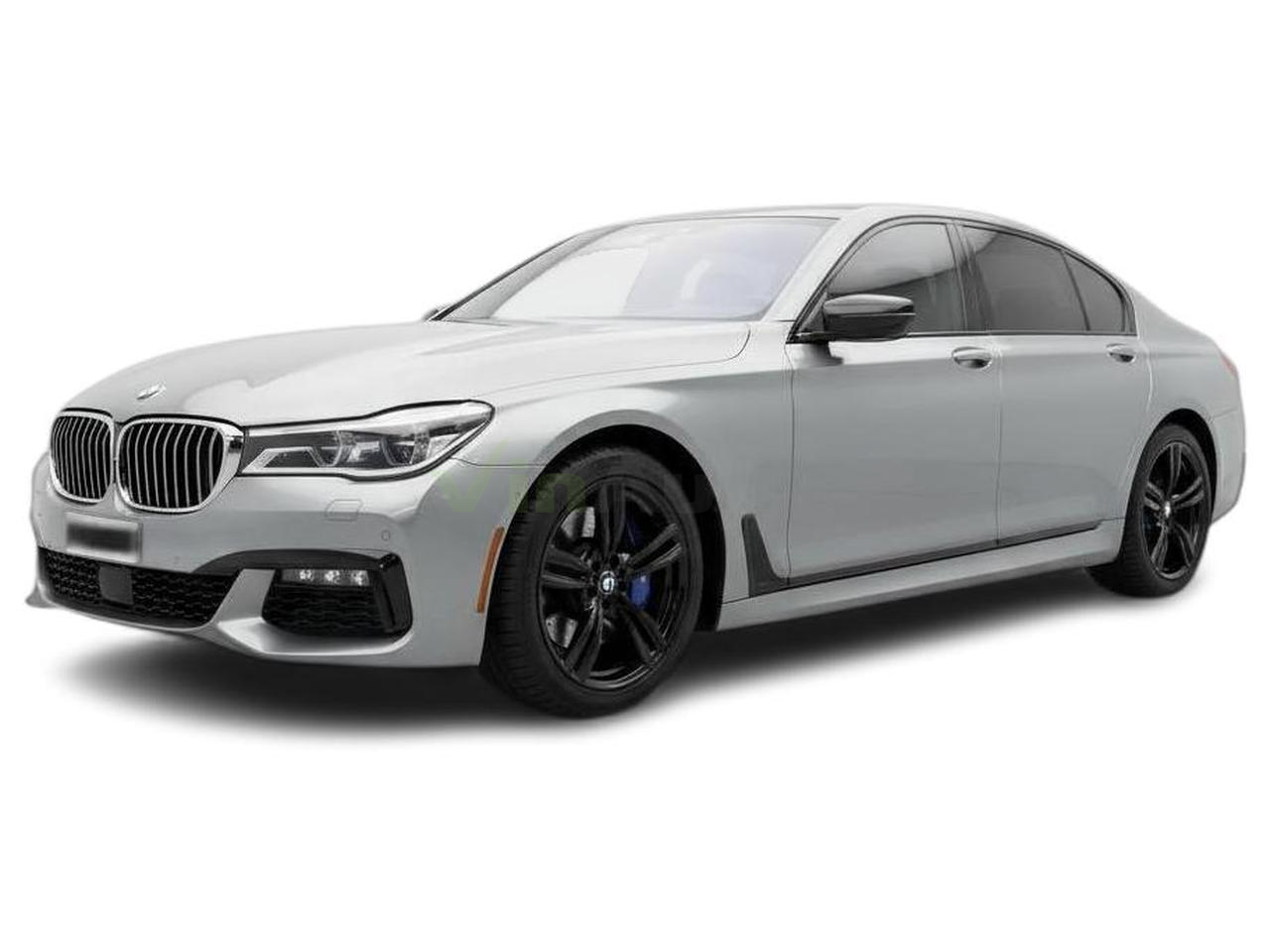Warning: Undefined array key "year" in /home/dev2/public_html/wp-content/themes/Divi-child/shortcodes.php on line 298
Warning: Undefined array key "make" in /home/dev2/public_html/wp-content/themes/Divi-child/shortcodes.php on line 298
Warning: Undefined array key "model" in /home/dev2/public_html/wp-content/themes/Divi-child/shortcodes.php on line 298
The Good
The 2016 BMW 7-Series offers powerful, smooth engines, a supremely luxurious and quiet cabin, and innovative technology like gesture control, appealing to emotional buyers seeking prestige and performance. Practical buyers will appreciate its advanced safety features, comfortable long-distance cruising, surprisingly decent fuel efficiency in the 740i, and strong depreciation making it a good used value proposition.
The Bad
Known weaknesses for the 2016 BMW 7-Series include its complex iDrive system with a learning curve, potentially high maintenance and repair costs, especially for the V8 engine, and rapid depreciation. Electronic glitches can occur, and the ride may be firm with larger wheels. High parts costs and potential air suspension issues are also watch-outs.
2016 BMW 7-Series: Quick Overview
- Engine Options:
- 740i: 3.0-liter Turbocharged Inline-6 (B58)
- 750i: 4.4-liter Twin-Turbocharged V8 (N63TU2)
- 740e (PHEV, later availability within the model year): 2.0-liter Turbocharged Inline-4 + Electric Motor
- Horsepower:
- 740i: 320 hp
- 750i: 445 hp
- 740e: 322 hp (combined)
- Fuel Economy (EPA estimates):
- 740i RWD: 21 MPG city / 29 MPG highway / 24 MPG combined
- 740i xDrive: 20 MPG city / 29 MPG highway / 23 MPG combined
- 750i RWD: 17 MPG city / 25 MPG highway / 20 MPG combined
- 750i xDrive: 16 MPG city / 25 MPG highway / 19 MPG combined
- 740e xDrive: 27 MPG combined / 64 MPGe combined (electric + gas)
- 0-60 Times:
- 740i: Approximately 5.4 seconds
- 750i: Approximately 4.3 seconds
- 740e: Approximately 5.1 seconds
- Towing Capacity: Not officially rated or recommended for towing in the US market.
- Trim-Level Features:
- Standard (740i): Full LED adaptive headlights, 18-inch alloy wheels, adaptive air suspension, panoramic sunroof, power-operated trunk, soft-close doors, dual-zone automatic climate control, Dakota leather upholstery, wood trim, 16-way power-adjustable heated front seats, power-adjustable steering column, iDrive infotainment with 10.2-inch touchscreen, navigation, 16-speaker Harman Kardon sound system, Gesture Control, rearview camera, front/rear parking sensors.
- 750i Adds: More powerful V8 engine, 19-inch wheels, Nappa leather upholstery, 20-way power multi-contour front seats, head-up display, quad-zone automatic climate control.
- Key Optional Packages & Features:
- Driving Assistance Package: Blind-spot monitoring, lane departure warning, frontal collision warning.
- Driving Assistance Plus Package: Adds active cruise control, traffic jam assistant, active lane keeping.
- Executive Package: Power rear sunshades, ventilated and massaging front seats, ceramic controls.
- Luxury Rear Seating Package: Heated, ventilated, massaging, and power-adjustable rear seats; rear entertainment.
- M Sport Package: Sportier exterior styling, M-branded steering wheel, unique wheels.
- Integral Active Steering (rear-wheel steering)
- Bowers & Wilkins Diamond Surround Sound System
- Remote Control Parking (limited availability)
- Apple CarPlay compatibility (optional, sometimes subscription-based)
2016 BMW 7-Series Specifications
Vehicle History Report
What Problems Does the 2016 BMW 7-Series Have?
Electronic glitches are common given the vehicle's immense technological content. Owners have reported issues with the iDrive system freezing, various sensor malfunctions, and the advanced features like Gesture Control sometimes being finicky. The adaptive air suspension system, while providing a sublime ride, is prone to component failure over time; air springs, compressors, or height sensors can fail, leading to costly replacements and a sagging or stiff ride.
Other reported issues include electrical system problems, such as premature battery drain or alternator failures, and various warning lights appearing without clear cause. Plastic components in the cooling system are also susceptible to degradation and leaks as the vehicle ages.
Several recalls have been issued for the 2016 7-Series:
- NHTSA Campaign Number 16V071000: Rearview camera display may not show a clear image due to software.
- NHTSA Campaign Number 17V024000: Certain 750i models may experience a loss of power steering assist from a faulty power steering hose.
- NHTSA Campaign Number 17V683000: A crankshaft sensor issue could cause the engine to stall in some 740i models.
- NHTSA Campaign Number 19V060000: Potential detachment of the steering gear tie rod, leading to loss of steering control (affecting 740i, 750i).
- NHTSA Campaign Number 20V677000: PCV valve heater may short circuit and increase fire risk (740i, 750i).
Long-term reliability is a major consideration. While the chassis and build quality are high, the intricate electronics and specialized engine components mean that significant repair costs are almost inevitable past 70,000-100,000 miles. Diligent maintenance and a substantial repair fund are essential for long-term ownership.
How long will the 2016 BMW 7-Series last?
What Technology & Safety Features are Included?
Infotainment & Connectivity:
At its core is the innovative iDrive 5.0 system, which debuted a 10.2-inch high-resolution touchscreen display alongside the traditional rotary controller and voice commands. A standout feature was Gesture Control, allowing drivers to manage volume or answer calls with simple hand movements. Standard features included a robust navigation system with real-time traffic, a Wi-Fi hotspot, Bluetooth connectivity, and USB ports. Entertainment was delivered via a standard 16-speaker Harman Kardon surround sound system, with an optional, exquisite 16-speaker, 1400-watt Bowers & Wilkins Diamond Surround Sound System available for audiophiles. Apple CarPlay was an optional feature, sometimes requiring a subscription.
Driver-Assistance & Safety:
Standard safety tech included a rearview camera and front/rear parking sensors. Optional features significantly enhanced driver assistance:
- The Driving Assistance Package offered blind-spot monitoring, lane departure warning, and frontal collision warning with pedestrian detection.
- The Driving Assistance Plus Package expanded this with active cruise control with stop-and-go functionality, traffic jam assistant, active lane keeping assistant with side collision avoidance, and cross-traffic alert.
Crash-Test Ratings:
Due to its high cost and relatively low sales volume typical of flagship luxury sedans, the 2016 BMW 7-Series was not extensively crash-tested by major US organizations like the NHTSA or IIHS. However, BMW vehicles generally boast excellent safety engineering and consistently perform well in tests where they are conducted. The 7-Series' advanced safety systems and robust construction offer a high degree of occupant protection.
What Colors Options are Available?
2016 BMW 7-Series Prices and Market Value
Currently, in late 2023/early 2024, used market prices reflect substantial depreciation. A 2016 BMW 740i typically ranges from $18,000 to $28,000, while a 750i can be found between $20,000 and $32,000, depending heavily on mileage, condition, and options.
The 7-Series experiences rapid and severe depreciation, losing approximately 70-80% of its original value over eight years. This is common for large, complex luxury sedans. Factors affecting resale value include mileage (lower is better), overall condition, complete service records (crucial for German luxury cars), specific options (desirable tech and luxury packages can help), and engine type (the 740i often holds value slightly better due to lower perceived maintenance risks than the 750i's V8). A meticulously maintained example with clear history will fetch a premium.
2016 BMW 7-Series Cost of Ownership
2016 BMW 7-Series Fuel Efficiency
2016 BMW 7-Series Insurance
reasonable repair costs.
How Does the 2016 BMW 7-Series Compare to Other Vehicle?
- Mercedes-Benz S-Class (W222 generation): The S-Class is arguably the 7-Series' most direct competitor.
- Performance: Both offer powerful V6 and V8 engines with similar acceleration. The 7-Series typically feels a bit more agile and driver-focused, while the S-Class prioritizes ultimate refinement.
- Features: Both are laden with advanced tech and luxury. The S-Class often boasts an even more opulent interior and superior massage seats, while the 7-Series innovated with Gesture Control and Carbon Core construction.
- Reliability: Both are complex German luxury vehicles, meaning high maintenance costs and potential for electronic or air suspension issues. Mercedes' M278 V8 also had its share of issues.
- Price: New, they were comparably priced. Used, the S-Class tends to hold its value slightly better, often perceived as the benchmark for luxury.
- Audi A8 (D4 generation):
- Performance: The A8 offers excellent quattro all-wheel drive and strong V6 (3.0T) and V8 (4.0T) options. It provides a more understated yet equally capable driving experience.
- Features: Luxurious, impeccably built interior, with MMI infotainment. Less flashy tech than the BMW or Mercedes but very refined.
- Reliability: Generally considered slightly more reliable than the 7-Series and S-Class, but still high-cost maintenance is expected.
- Price: New, competitive. Used, it depreciates similarly to the 7-Series.
- Lexus LS (XF40 generation):
- Performance: The LS is more comfort-oriented, less sporty than its German rivals, with a smooth V8 (LS 460).
- Features: Exceptional build quality, serene quietness. Its technology, while functional, might feel a generation behind the Germans.
- Reliability: This is the LS's strongest suit, offering significantly higher long-term reliability and lower maintenance costs than any German competitor.
- Price: New, often slightly less than the Germans. Used, it holds its value remarkably better, making it an excellent alternative for buyers prioritizing long-term dependability and lower running costs.
Recommendations: For ultimate driving dynamics and cutting-edge tech, the 7-Series is a strong contender. For unparalleled luxury ambiance, the S-Class is often preferred. For understated luxury and all-weather capability, the Audi A8 is compelling. However, if reliability and significantly lower ownership costs are paramount for a used luxury sedan, the Lexus LS is a superior and more sensible alternative.
Final Verdict: Is the 2016 BMW 7-Series a Good Vehicle?
Is it worth buying? Yes, but with critical considerations. As a used vehicle, it offers phenomenal value, providing access to a flagship luxury car for a fraction of its original price due to rapid depreciation. However, prospective owners must enter with eyes wide open regarding the significant long-term ownership costs.
It's most advisable to buy a used 740i trim (for potentially lower engine-related repair costs compared to the 750i V8), with a comprehensive service history. A pre-purchase inspection by a BMW specialist is non-negotiable. Buyers must budget generously for annual maintenance (easily $1,500+) and anticipate potential major repairs (multiple thousands of dollars) as the vehicle ages. If you are prepared for these financial commitments, the 2016 7-Series delivers an unparalleled luxury driving experience for its used price point.

